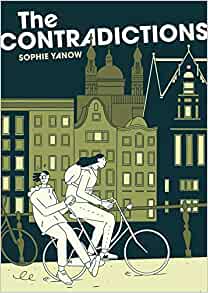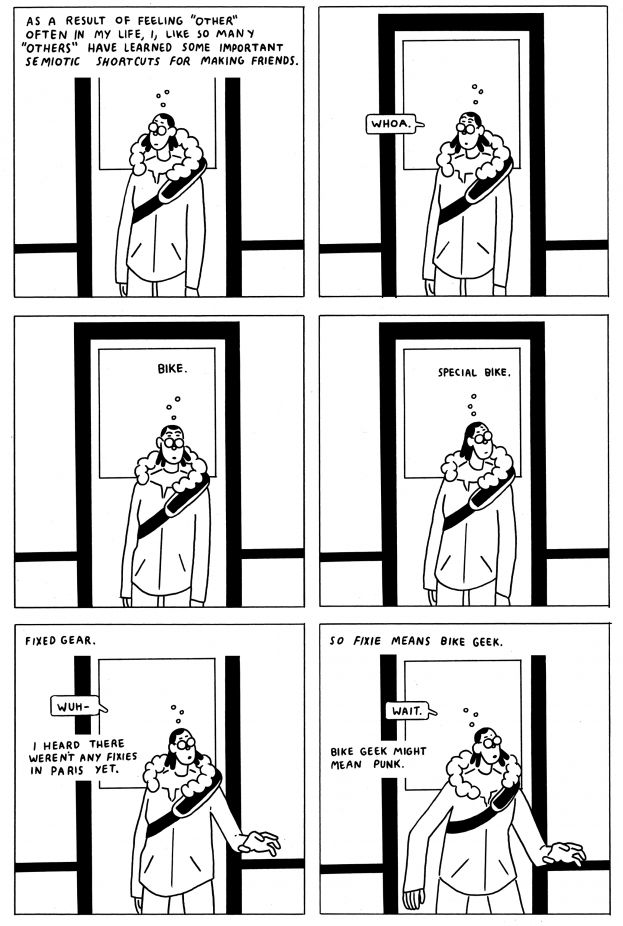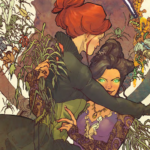
 Sophie Yanow’s first full-length graphic novel The Contradictions was posted online in its entirety from October 2018 until June this year, which means a lot of people who follow her work probably know it well already. There’s something about holding it in one’s hand, though, which makes it much easier to appreciate the clarity of her drawings and the way each panel is used with such economy, rendering everything else as superfluous.
Sophie Yanow’s first full-length graphic novel The Contradictions was posted online in its entirety from October 2018 until June this year, which means a lot of people who follow her work probably know it well already. There’s something about holding it in one’s hand, though, which makes it much easier to appreciate the clarity of her drawings and the way each panel is used with such economy, rendering everything else as superfluous.
On the surface, this can be read as a coming-of-age tale about a queer American student hitchhiking across Europe, from Paris to Amsterdam, Berlin, and back. What Yanow does, however, is use this deceptively simple premise to raise the kind of questions more and more young people have been asking lately: What does one’s subject of choice mean, as a student, in a world that only rewards capitalists? How does one stick to principles in a foreign country where they mean nothing? Are the things we choose to believe when we’re young worth fighting for?
The Contradictions stars a fictionalized Sophie trying to make sense of her new life in Paris. She has all kinds of encounters with friends, acquaintances, and strangers, and Yanow captures the awkwardness of these conversations with writing that is pitch-perfect. When she finds Zena, another exchange student who calls herself an anarchist, Sophie is compelled to examine her own life choices and evaluate them all.

Zena is an undeniably interesting character, a vegan anarchist who likes to shoplift because she thinks of it as an attack against a ruthless system. When the two girls decide to hitchhike and attend a concert in Amsterdam, the scales start to fall off Sophie’s eyes and she sees her friend in a different light.
From an artistic perspective, The Contradictions is also a study in European minimalism, populated by long-limbed figures and unremarkable faces. Yanow says her drawings have been heavily influenced by Franco-Belgian cartoonists and has spoken at length in interviews about how her figure drawing gives a lot of importance to angles. This inadvertently places the onus of the story firmly on the writing, allowing her deadpan wit to shine through.

It’s easy to categorize The Contradictions as autobiographical, but to do that is to miss the point. Yanow isn’t trying to tell us a story about herself here, as much as she is shining a light on that conflicted period we all go through when we are young and the world seems inscrutable. By using herself as a protagonist, she also brings an honesty to her work, making it easier for readers to identify with her insecurities.
Ultimately, this is a book that leaves us with more questions than answers, which is what good fiction often does. In a world where things held as certainties appear to be crumbling every week, her story becomes surprisingly poignant, placing us all in the position that Sophie is in, trying to make sense of things that everyone else seems to have understood except us. Towards the end, it seems as if Sophie is on the verge of a breakthrough. If Yanow decides to follow up her story with a sequel, I’m more than up for it.



![[PODCAST] NOT ENOUGH RESOURCES – EPISODE 57](https://geekd-out.com/wp-content/uploads/2019/02/MarioKart-150x150.png)